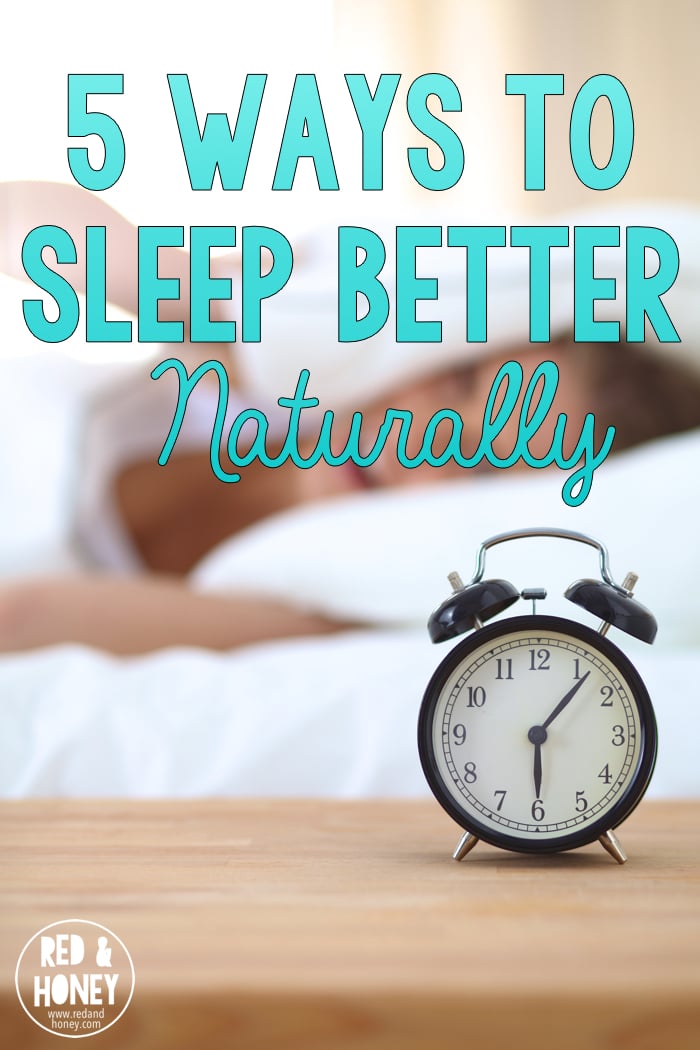
Post by contributor Erin Long of Home & Grace
Does anyone understand why our ideal is to ‘sleep like a baby’? I’ve spent a lot of nights with babies and let me tell you, I do not want to sleep like one.
But I don’t necessarily want to sleep like an adult, either. While sleep seems like it should come easily, it doesn’t always. In general I sleep well but between pregnancy insomnia, times of high stress and jet lag I’ve had my fair share of sleep difficulties.
While at times it can be easy to reach for the melatonin (it’s natural, right?) I’m learning some techniques to help me get a good night’s rest without heading to the medicine cabinet and that go beyond conventional wisdom (exercise, chamomile tea, relaxing baths, etc.).
Here are the 5 best ways I’ve found to naturally improve sleep:

1. Avoid caffeine after noon
I know, I’m starting with what will probably be the most unpopular suggestion. When you’re having trouble sleeping it can seem like the only thing that will get you through the afternoon is a warm cup of caffeine.
But hear me out: caffeine stays in your systems for up to 14 hours so you could still be feeling the buzz from that afternoon coffee in the wee hours of the morning. Reach for energy-giving foods such as nuts, veggies or fruit if you feel an afternoon lull coming on.
2. Limit exposure to blue light after dark
Blue light is the artificial light emitted by electric bulbs, from light fixtures to tablet screens. While it’s great that it allows us to do stuff after sunset, it can alter our circadian rhythm and decrease melatonin production.
Basically, blue light can sabotage sleep. It is hard (re: impossible) to avoid it completely but there are ways to limit exposure.
Simply dimming the lights or having fewer on makes a difference but I recommend using salt lamps or natural beeswax candles once the sun goes down (Wellness Mama has a great post detailing the many benefits of salt lamps). The soothing orange glow from a salt lamp or candle creates a relaxed atmosphere to help prepare for restful sleep.

3. No screens at least an hour before bed
This does fall under the previous suggestion but because of the prevalence of technology in pretty much everyone’s life, it bears addressing separately. Also: the light from devices, tablets in particular, is extra disruptive to melatonin levels.
And I’m going to admit right now that I don’t do this. With two kids under 4, the only chance I have to spend quality time with the internet (or relaxing in front of a movie with my husband) is right before I go to bed. But I’m trying to do better.
For me that means once it’s dark I try to: check email/social media less, read paper books, do things other than watching movies with the hubby (not a bad thing!)
4. Make sure you’re getting enough magnesium
Magnesium deficiency is linked to a host of health issues and many of them are associated with fatigue and sleep difficulties. The best way to ensure you get enough magnesium is to either use magnesium oil or magnesium lotion.
Personally, I’ve found magnesium lotions to be more irritating and sticky so I prefer to spray on the oil and then put plain lotion over top. I do this right before going to bed and if I’m having particular difficulty sleeping in the morning as well.
You can soak in a hot tub with magnesium flakes but using the oil is much more cost effective.

5. Use soothing essential oils
This is the most recent addition to my better-sleep repertoire and I am hooked. I started rubbing 2-3 drops of lavender on the soles of my feet right before bed and add a couple to my pillow (be careful not to do too much – it can irritate your eyes).
Since I’m still discovering this myself I recommend you check out The Prairie Homestead’s post Essential Oils for a Better Night’s Sleep. She’s got lots of great oil options so you can find the one that works best for you.
Do you ever have difficult sleeping well?
Disclaimer: I am not a doctor or medical professional, and this post should not be taken as medical advice. Please do your own research. Material on this blog is provided for informational purposes only. It is general information that may not apply to you as an individual, and is not a substitute for your own doctor’s medical care or advice.
Original article and pictures take redandhoney.com site
Комментариев нет:
Отправить комментарий